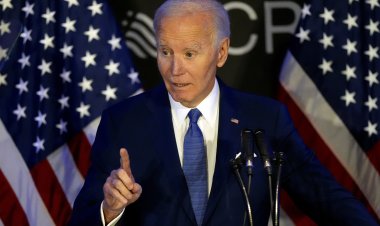Criticism mounts against D.C. consultants as Democrats seek new leadership
The article highlights a lack of discourse on solutions to the party's major issues. However, one particular group is disproportionately held responsible.

During the first DNC-sanctioned forum of this low-profile chair race on Saturday, candidates voiced their dissatisfaction with “D.C. insiders.” New York state Sen. James Skoufis pledged to “kick to the curb” these consultants, while Minnesota Democratic-Farmer-Labor Party Chair Ken Martin asserted that the “D.C. consultants” will “be gone when I’m there.” Wisconsin Democratic Party Chair Ben Wikler promised to enter 2025 “with no commitments to anyone who's been on a campaign payroll before.”
This sentiment reflects a party grappling with the aftermath of having spent approximately $1.5 billion in the final months of the campaign, ultimately falling short against President-elect Donald Trump. As the party seeks explanations for its significant losses in 2024, it seems that consultants have become convenient scapegoats, with DNC candidates largely sidestepping direct conflicts among themselves. They collectively recognize the necessity for the party to reconnect with the working class and establish a sustained campaign infrastructure nationwide, though any light criticisms were made without identifying individuals.
Saturday’s forum marked the first of four discussions set to take place in January, leading up to the DNC chair election on Feb. 1, which will represent a major decision for Democrats as they position themselves for the second Trump era.
Here are five key takeaways from the virtual forum:
**Paging Jaime Harrison**
While the candidates dedicated much of their 90-minute discussion to critiquing D.C., nearly all committed to relocating to the capital if elected. This concern has been a topic of discussion among DNC members, many expressing frustration over current DNC Chair Jaime Harrison’s choice to remain in South Carolina throughout his tenure.
Former Maryland Gov. Martin O’Malley articulated that “leaders lead from the front, and they have to be present in the center of the circle.” Skoufis, the only current elected official in the race, noted his intention to resign from the New York state Senate, emphasizing that “the next DNC chair must be fully committed.”
However, Wikler, who has a young family in Wisconsin, did not commit to a move. He mentioned his plan to maintain a “congressional schedule” and regularly be in D.C., but stated, “I think there's strength that comes from being in a place where Democrats don't win every election a lot of the time.”
**A mostly white, mostly male field of “dudes”**
It was apparent throughout the video-conference forum on YouTube that the eight candidates are predominantly white and male. With the exception of former Democratic presidential candidate Marianne Williamson and entrepreneur Quintessa Hathaway, the competition fails to reflect the party's broader diversity.
This reality frustrates some Democrats who wish the candidate pool mirrored the party more closely. Democratic campaign veteran Caitlin Legacki remarked on the lack of representation, stating, “There are no women involved in this conversation. All of our biggest, most high profile pundits are dudes. All of the senators that are writing op-eds about the future of our party are dudes. And then you’ve got these candidates for DNC are dudes.”
**She’s back**
Williamson, the bestselling self-help author, is reintroducing her unique political style in the race for chair.
Despite having minimal chances of winning, she adds intrigue to the competition. Williamson positioned herself as a spiritual healer, expressing that she’s “worked very up close and personal with people whose lives were in trouble,” referring to issues like healthcare access and economic opportunity.
She also criticized the DNC's failure to facilitate a “robust primary,” calling it the organization’s most significant error. “In the name of saving democracy,” she stated, “we ourselves suppressed democracy.”
**It’s the economy, stupid**
The candidates acknowledged what many believe was a core reason for the party's electoral struggles last year: inadequate economic messaging.
O’Malley identified Democrats’ disconnection from the realities of American households as “the biggest mistake.” Wikler mentioned that “there were millions of Americans who didn’t know that we were fighting for working families,” while Martin highlighted the troubling perception that Republicans best represent working-class interests, describing this as a “damning indictment of our party brand.”
Despite this recognition, the candidates did not propose concrete solutions to rectify this disconnect, highlighting a potential vulnerability for the party as Trump looks to take credit for an economic upswing initiated under President Joe Biden.
O’Malley stressed the need for the next DNC chair to “reassert our dedication” to focusing on economic security, while Martin suggested that successful outreach relies on year-round organizing in key communities. Wikler’s idea for recalibrating the message was to “communicate everywhere” from conservative media to unconventional platforms.
**So much for the resistance**
In a party that has largely campaigned against Trump over the past decade, the candidates seeking to lead the DNC had little to comment regarding the incoming president.
While O’Malley concluded by stating that the next DNC chair must “take on Trump and save our Republic,” and Skoufis referred to lessons learned from campaigning in a Trump-supporting district, it appears that those aiming to guide the party through its next chapter are adapting to the evolving political landscape.
Max Fischer for TROIB News
Find more stories on Business, Economy and Finance in TROIB business












